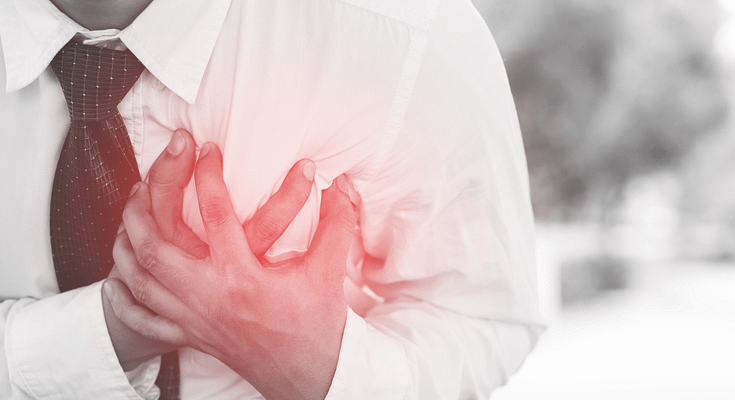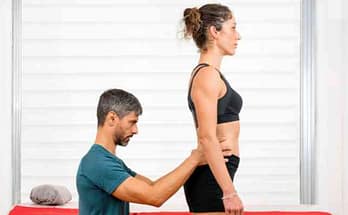Good posture is essential to your overall health, but do you know why? A great way to understand why posture is so important is by looking at how your body reacts when you slouch. Poor posture can cause pain in various places, including the upper back and shoulders, hips, knees, and ankles.
Let’s look at the anatomy of the spine (the bones that make up our back). Several vertebrae along the spine’s length are known as thoracic vertebrae, which connect directly to the ribs. These thoracic vertebrae can become misaligned due to trauma or inherited traits. This puts pressure on the surrounding nerves, causing symptoms like chest pain.
Key takeaways
Bad posture can cause chest pain. While many factors could be causing your chest pain (including low blood pressure), one of them might be bad posture because it strains your muscles and joints, which causes inflammation in these areas.
Good Posture and Bad Posture
Good posture helps prevent back pain, neck pain, and shoulder and knee problems. Good posture also keeps the spine in alignment, preventing foot problems such as plantar fasciitis or fallen arches from developing.
Bad posture can cause back pain, neck pain, and shoulder issues and may lead to knee problems over time. The most common cause of bad posture is slouching or sitting incorrectly for extended periods (like at a computer). The spine curves forward when you slouch because your muscles become weak and tight.
The ligaments in your joints stretch out too much and become loose, so they do not support the body properly anymore. This causes stress on the joints, and it leads to injury!
Upper-Crossed Syndrome (UCS)
There are many reasons why your poor posture could be causing chest pain, but the most likely reason is upper-crossed syndrome or UCS. UCS is a common posture problem that occurs when tight muscles in the shoulders, neck, and chest cause you to slump forward and round your shoulders. This puts pressure on your body’s joints, which can cause pain in the upper back, shoulders, neck, and chest.
UCS can be caused by many things:
- Sitting at a desk all day with bad habits like slouching over a computer screen for long hours
- Carrying heavy backpacks on one shoulder
- Sleeping on an incline pillow
- Even something as simple as wearing high heels every day
These habits can still trigger UCS symptoms even if they aren’t present, or you have stopped using them (like me). It’s possible for them to trigger UCS symptoms again if not corrected right away. This type of muscle tightness tends build up over time and become chronic muscle strain.
Poor posture exerts stress on your spine
The spine is one of the most complex structures in the body. It houses and protects your spinal cord, which is part of your central nervous system and responsible for transmitting all signals from the brain to other parts of your body. The spine also serves as major support for your upper body, shoulders, and head.
The spine’s role in our overall health makes it an ideal target for poor posture habits that can cause stress to build up on this vital structure over time (and lead to back pain).
Being aware of bad posture
Most of us have bad posture and don’t even know it. You may feel like you’re standing or sitting up straight, but if you’ve been in the same position for a long time, your muscles may have gotten used to that position and started to pull on your bones and joints in new ways.
If you have chest pain that seems to be related to how you hold yourself upright, try experimenting with different postures: sit up straight with good posture, slouch over at the desk with bad posture (and then again later when trying to correct), stand tall while taking deep breaths every few minutes. If one feels better than another at relieving chest pain symptoms, there’s a good chance one of these choices is helping correct their underlying issues!
Slouching can cause chronic chest pain
You’ve probably heard that bad posture can cause back pain, but did you know it can also cause chronic chest pain?>
Chronic chest pain is often caused by unilateral costocervical syndrome (UCS). UCS affects your upper back and neck muscles and nerves, causing them to become tight, sore, and uncomfortable. Over time, this can lead to muscle spasms and chronic pain in your chest area.
Over time, the constant upward pull of your shoulders causes them to become tight. This means that when you slouch forward with rounded shoulders—as many people do—you’re putting even more strain on these sensitive areas between your shoulder blades. That’s why it’s important to remember how much impact poor posture has on our bodies!
A subluxation or misalignment of vertebrae in the thoracic spine
The thoracic spine comprises twelve vertebrae, which are responsible for supporting the weight of your upper body. When one or more of these vertebrae are subluxated or misaligned, nerve roots can become pinched between the vertebrae. This can cause inflammation and pain in the chest, especially when you move around or exercise.
The symptoms associated with a pinched nerve depend on which nerves have been affected by the misalignment in your spine:
- Pain radiating down into one arm
- Tingling sensation shooting down an arm
- Weakness in one arm (if there is damage to a muscle)
Poor posture can affect breathing and lung capacity
Poor posture can cause a pinched nerve in the neck, resulting in pain and discomfort. The muscles on either side of your spine are connected to each other by tendons, protected by sheaths called “fascia.”
When you slouch or lean your head forward for an extended period, these fasciae become stretched out, making them more susceptible to injury. Often, this results in muscle spasms that send pain signals from your back up through the nerves running from there into your brain—leading to pain along those same pathways (the first three segments of C5-C7).
Suppose you’ve ever experienced numbness down one arm for no apparent reason with no known trauma or injury preceding it. In that case, chances are that this has happened because one of those nerves got pinched against a bone during poor posture—in this case, the clavicle (collarbone). The same could happen if you lean too far back while sitting at work or driving home.
Ribs being out of place or inflamed nerves
Chest pain can also be caused by other ribs being out of place or inflamed nerves. If you have had rib injuries, you may suffer from chronic pain due to having misplaced or degenerated ribs. The most common cause of rib misalignment is a previous injury to the spine or high-impact sports such as football and hockey that create a lot of pressure on your chest wall.
Inflamed nerves are another possible cause of chest pain, especially if they run through your neck and shoulders. When this happens, you may feel pain anywhere around your upper body (including your arms). Still, it mainly stems from the neck area, which puts pressure on the nerves going through there and eventually causes them to send messages of discomfort down into other areas like your chest region or back muscles (it depends on where exactly these nerves go).
You should consult with a doctor immediately if any new medical problems arise as soon as possible so that proper treatment measures can be taken before anything worse develops over time!
Effects of poor posture
Having a healthy back is important enough, but the effects of poor posture go beyond that to include overall health, too. For example, poor posture can significantly impact your breathing, causing fatigue and even chronic pain.
Poor posture leads to chronic pain in your neck, head, and shoulders. This is because these areas are all interconnected. When one area is out of balance with another, it throws off the entire system. This can lead to headaches, backaches, or even shoulder problems (like frozen shoulders).
When it comes to chest pain, it’s important not to ignore the symptoms or assume they’ll just go away on their own. Chest pain can be a sign of many different conditions. Still, if you have been diagnosed with one, you must start treating this immediately. If untreated for too long, the condition may become life-threatening and require emergency medical attention.
While many factors could be causing your chest pain (including low blood pressure), one of them might be bad posture because it strains your muscles and joints, which causes inflammation in these areas. It can also affect other parts of our bodies, such as our necks and backs!




